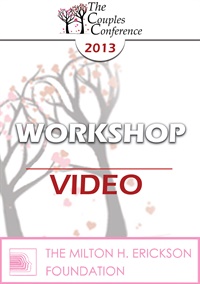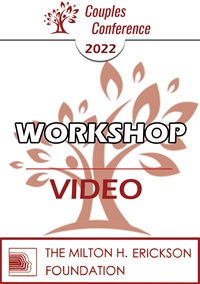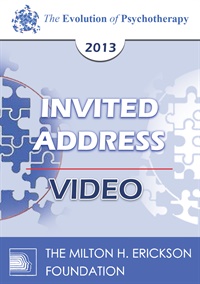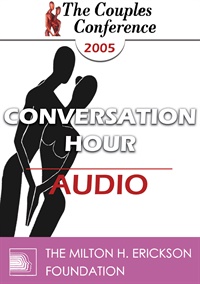
- Average Rating:
- Not yet rated
- Topic Areas:
- Conversation Hours | Couples Therapy | Conflict | Therapist Techniques
- Categories:
- Couples Conference | Couples Conference 2005 | Pioneers in Couples and Family Therapy
- Faculty:
- Ellyn Bader, PhD
- Duration:
- 41:23
- Format:
- Audio Only
- Original Program Date:
- Mar 04, 2005
- Short Description:
- A comprehensive exploration of working with difficult couples through a developmental model, focusing on differentiation, communication techniques, and strategic therapeutic interventions. Learn how to help couples identify destructive patterns, address hidden vulnerabilities, and develop more effective relationship skills through structured, goal-oriented therapy.
- Price:
- $15.00 - Base Price
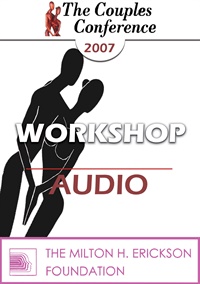
- Average Rating:
- Not yet rated
- Topic Areas:
- Workshops | Couples Therapy | IMAGO | Relationships | Conflict
- Categories:
- Couples Conference | Couples Conference 2007
- Faculty:
- Harville Hendrix, PhD
- Duration:
- 2:05:47
- Format:
- Audio Only
- Original Program Date:
- Apr 29, 2007
- Short Description:
- Inevitable conflict, the second stage of all committed relationships, is growth "trying to happen." This session will address core issues most couples face, working with difficult couples, how to transform destructive conflict into creative tension through the dialogue process and how to discern when a couple can or cannot be helped. Participants will be introduced to a therapy process that transforms conflict into connection and facilitates couples being healers for each other.
- Price:
- $15.00 - Base Price
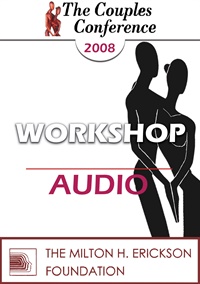
- Average Rating:
- Not yet rated
- Topic Areas:
- Workshops | Assessment | Couples Therapy | Conflict | Sex and Sexuality
- Categories:
- Couples Conference | Couples Conference 2008
- Faculty:
- Otto Kernberg, MD
- Duration:
- 2:27:19
- Format:
- Audio Only
- Original Program Date:
- Apr 25, 2008
- Short Description:
- This workshop will explore the assessment of the functioning of couples in their sexual life, their daily interactions, and their individual and jointly arrived at value systems. The techniques of this assessment, the combination of couples’ and individual partners’ interviews will be followed by an overview of alternative therapeutic strategies.
- Price:
- $15.00 - Base Price
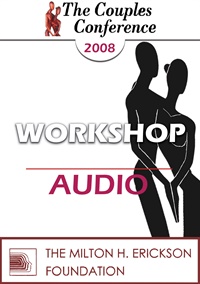
- Average Rating:
- Not yet rated
- Topic Areas:
- Workshops | Conflict | Couples Therapy | Trauma
- Categories:
- Couples Conference | Couples Conference 2008
- Faculty:
- Peter Pearson, PhD
- Duration:
- 2:19:30
- Format:
- Audio Only
- Original Program Date:
- Apr 27, 2008
- Short Description:
- High conflict and chronically distresses add to each others’ trauma while triggering historical trauma. Reducing, calming or eliminating the emotional triggers is an essential part of changing their negative ingrained patterns. See a live demonstration and/or experience a process to bring about immediate relief of painful memories (and sometimes) not even having to talk about them.
- Price:
- $15.00 - Base Price
Tags: Conflict Couples Therapy Trauma
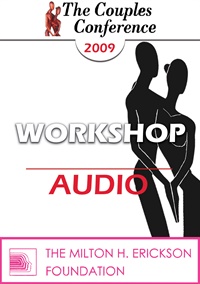
- Average Rating:
- Not yet rated
- Topic Areas:
- Workshops | Couples Therapy | Conflict | Relational Life Therapy Model (RLT) | Strategic Therapy
- Categories:
- Couples Conference | Couples Conference 2009 | Pioneers in Couples and Family Therapy
- Faculty:
- Terry Real, LICSW
- Duration:
- 1:52:50
- Format:
- Audio Only
- Original Program Date:
- May 01, 2009
- Short Description:
- The reason why most couples' characteristic fights never get resolved is because in our most heated moments, we stop fighting with each other. Core negative images (CNIs) start fighting and the two real partners get lost. This workshop teaches participants how to help partners identify, make explicit, accept, and ultimately work with one another's core negative images. As partners are taught to utilize each other's CNIs, rather than fight them, all sorts of creative and deliberating possibilities emerge.
- Price:
- $15.00 - Base Price
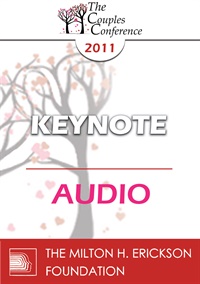
- Average Rating:
- Not yet rated
- Topic Areas:
- Keynotes | Couples Therapy | Dreamwork | Gottman Method | Conflict
- Categories:
- Couples Conference | Couples Conference 2011
- Faculty:
- Julie Gottman, PhD
- Duration:
- 39:44
- Format:
- Audio Only
- Original Program Date:
- Apr 03, 2011
- Short Description:
- Gridlocked perpetual conflicts often destroy relationships. They repeatedly surface, causing partners endless pain, fear, even trauma. Yet every couple faces them. In this address, Dr. Julie Gottman describes a dyadic therapy method that uncloaks the dreams, history and fears beneath partners’ issues while fostering greater compassion and connection in the couple. An edited film will be shown to demonstrate this intervention.
- Price:
- $15.00 - Base Price
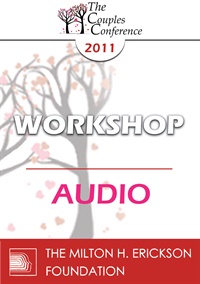
- Average Rating:
- Not yet rated
- Topic Areas:
- Workshops | Conflict | Couples Therapy | Pain and Healing | Relationships
- Categories:
- Couples Conference | Couples Conference 2011
- Faculty:
- Julie Gottman, PhD
- Duration:
- 1:38:30
- Format:
- Audio Only
- Original Program Date:
- Apr 02, 2011
- Short Description:
- Couples’ conflicts that hurt and go unprocessed often lead to chasms of emotional distance. This workshop explains and demonstrates with film how a couple can learn to process their own battles and move from resentment to understanding, accountability, and repair. The Gottman “Recovery Kit” will be explained and given to each participant.
- Price:
- $15.00 - Base Price
- Average Rating:
- Not yet rated
- Topic Areas:
- Workshops | Couples Therapy | Intimacy | Sex and Sexuality | Conflict
- Categories:
- Couples Conference | Couples Conference 2012
- Faculty:
- Esther Perel, MA, LMFT
- Course Levels:
- Master Degree or Higher in Health-Related Field
- Duration:
- 1:54:46
- Format:
- Audio and Video
- Original Program Date:
- Apr 27, 2012
- Short Description:
- In this workshop, we will look at fantasy as an ingenious way our creative mind overcomes all sorts of relational and intra psychic conflicts around desire and intimacy. Therapists can help clients develop a view of fantasy as a narrative that creates a safe space to experience the pleasure that can invigorate their loving relation-ships. They will decipher the meaning of sexual fantasies, approaching them more as dreams or complex symbolic structures than as literal narratives of secret intentions.
- Price:
-
Sale is $29.00
price reduced from Base Price - $59.00
- Average Rating:
- Not yet rated
- Topic Areas:
- Workshops | Affairs | Couples Therapy | Attachment | Attunement | Conflict | Gottman Method
- Categories:
- Couples Conference | Couples Conference 2012
- Faculty:
- John Gottman, PhD
- Course Levels:
- Master Degree or Higher in Health-Related Field
- Duration:
- 1:47:47
- Format:
- Audio and Video
- Original Program Date:
- Apr 29, 2012
- Short Description:
- The Atone-Attune-Attach model of couples’ therapy for healing from a revealed extra-relationship affair, with secrecy deception is described. Each of the three phases has 4 objectives. The roles of conflict avoidance and self-disclosure avoidance are discussed, as well as the Gottman-Rapoport conflict blueprint. To deal with attachment injuries and regrettable past incidents, the Gottman Recovery Kit is described. The Gottman-Rusbult-Glass cascade forms the basic theory for this therapy. The roles of cherishing and gratitude versus trashing and betrayal are discussed, as well as the theory of attunement and trust, and CL-ALT and betrayal.
- Price:
-
Sale is $29.00
price reduced from Base Price - $59.00
- Average Rating:
- Not yet rated
- Topic Areas:
- Keynotes | Marriage | Conflict | Couples Therapy | Relationships
- Categories:
- Couples Conference | Couples Conference 2013
- Faculty:
- Harriet Lerner, PhD
- Course Levels:
- Master Degree or Higher in Health-Related Field
- Duration:
- 56:57
- Format:
- Audio and Video
- Original Program Date:
- Apr 20, 2013
- Short Description:
- Lerner will describe the key aspects of having a clear and courageous voice with a difficult partner when a relationship is stuck in silence, fighting, distance, and blame.
- Price:
-
Sale is $29.00
price reduced from Base Price - $59.00
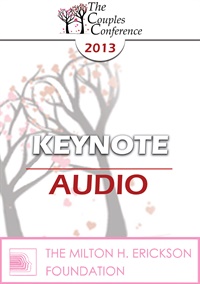
- Average Rating:
- Not yet rated
- Topic Areas:
- Couples Therapy | Keynotes | Conflict | Relationships
- Categories:
- Couples Conference | Couples Conference 2013
- Faculty:
- Bill O'Hanlon, MS
- Duration:
- 38:30
- Format:
- Audio Only
- Original Program Date:
- Apr 21, 2013
- Short Description:
- Too little acknowledgment will lead to alienation of one of both partners in couples therapy, but too much acknowledgment without a compelling invitation to move on from conflict, blame and the past to new possibilities won’t work either. Learn how to maintain that delicate balance and let the couple teach you when to use which method.
- Price:
- $15.00 - Base Price
- Average Rating:
- Not yet rated
- Topic Areas:
- Workshops | Pain and Healing | Couples Therapy | Sex and Sexuality | Conflict | Infidelity | Intimacy
- Categories:
- Couples Conference | Couples Conference 2013
- Faculty:
- Marty Klein, PhD
- Course Levels:
- Master Degree or Higher in Health-Related Field
- Duration:
- 2:04:57
- Format:
- Audio and Video
- Original Program Date:
- Apr 21, 2013
- Short Description:
- Couples therapy typically pathologizes porn use while legitimizing the grievances of the user’s partner. While this approach may seem logical, it rarely increases sexual/relationship satisfaction. How do we hold both partners while they struggle to define their behavior, contract, and emotions? This talk examines a different approach to intrapsychic conflict and power struggles over porn use. We’ll explore underlying rela-tional issues, including: Is conflict about pornography a way to avoid confronting defi-cits in the sexual (or non-sexual) relationship? Are one or both partners acting out body image issues? Is porn use infidelity?
- Price:
-
Sale is $29.00
price reduced from Base Price - $59.00
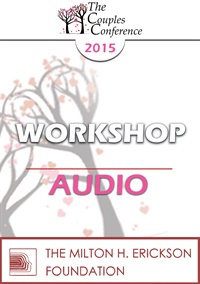
- Average Rating:
- Not yet rated
- Topic Areas:
- Couples Therapy | Workshops | Love | Communication | Conflict | Relationships
- Categories:
- Couples Conference | Couples Conference 2015
- Faculty:
- Bill O'Hanlon, MS
- Duration:
- 1:36:23
- Format:
- Audio Only
- Original Program Date:
- Apr 26, 2015
- Short Description:
- Couples, because they come from different background and have different understandings, often use the same words to mean different things, leading to unnecessary conflict. This workshop will provide a simple, but powerful method to quickly resolve couples conflicts using action talk.
- Price:
- $15.00 - Base Price

- Average Rating:
- Not yet rated
- Topic Areas:
- Couples Therapy | Workshops | Conflict | Psychobiological Approach to Couples Therapy (PACT)
- Categories:
- Couples Conference | Couples Conference 2017 | Pioneers in Couples and Family Therapy
- Faculty:
- Stan Tatkin, PsyD, MFT
- Duration:
- 1:20:34
- Format:
- Audio Only
- Original Program Date:
- Apr 02, 2017
- Short Description:
- This workshop explores how to identify and resolve deal breakers—conflicts that, left unaddressed, threaten the viability of a relationship. Grounded in a psychobiological approach, Tatkin outlines a structured process that supports secure functioning, including techniques like cross-questioning, the five-minute argument, and amplifying conflict for clarity. Therapists are encouraged to take the long view, helping partners face uncomfortable truths while strengthening alliance and accountability.
- Price:
- $15.00 - Base Price
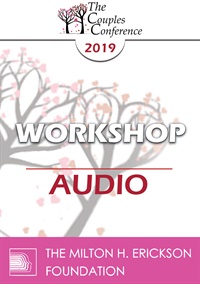
Credit available - Click Here for more information
- Average Rating:
- Not yet rated
- Topic Areas:
- Workshops | Couples Therapy | Gottman Method | Conflict | Relationships | Avoidant
- Bundle(s):
- CC19 Main Conference Audio Bundle | CC19 Individual Selections
- Categories:
- Couples Conference | Couples Conference 2019 | Online Continuing Education
- Faculty:
- Carrie Cole, M.Ed, LPC | Donald Cole, DMIN, LPC, LMFT
- Duration:
- 1:19:09
- Format:
- Audio Only
- Original Program Date:
- Apr 12, 2019
- Short Description:
- Particular attention will be given to working with couples displaying two patterns of dysfunction: escalation and avoidance.
- Price:
- $15.00 - Base Price
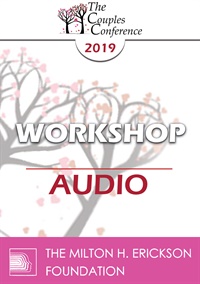
Credit available - Click Here for more information
- Average Rating:
- Not yet rated
- Topic Areas:
- Workshops | Couples Therapy | Gottman Method | Conflict | Avoidant
- Bundle(s):
- CC19 Main Conference Audio Bundle | CC19 Individual Selections
- Categories:
- Couples Conference | Couples Conference 2019 | Online Continuing Education
- Faculty:
- Carrie Cole, M.Ed, LPC | Donald Cole, DMIN, LPC, LMFT
- Duration:
- 1:19:55
- Format:
- Audio Only
- Original Program Date:
- Apr 12, 2019
- Short Description:
- Particular attention will be given to working with couples displaying two patterns of dysfunction: escalation and avoidance.
- Price:
- $15.00 - Base Price
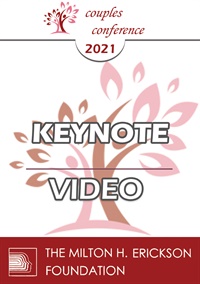
Credit available - Click Here for more information
- Average Rating:
- Not yet rated
- Topic Areas:
- Conflict | Couples Therapy | Keynotes | Cultural and Social Contexts
- Categories:
- Couples Conference | Couples Conference 2021 | Online Continuing Education | Pioneers in Couples and Family Therapy
- Faculty:
- William Doherty, PhD
- Course Levels:
- Master Degree or Higher in Health-Related Field
- Duration:
- 1 Hour
- Format:
- Audio and Video
- Original Program Date:
- Jun 05, 2021
- Short Description:
- We live in the most polarized era since the 1850s. The presenter will describe the connection between escalating couple conflict and escalating political polarization. He will propose ways that therapists can work with politically divided couples, and he will describe his work since 2016 on “red/blue” polarization in the U.S. via the national nonprofit Braver Angels. He will argue that couples therapists have much to offer a nation in trouble.
- Price:
- $29.00 - Base Price
- Average Rating:
- Not yet rated
- Topic Areas:
- Workshops | Conflict | Couples Therapy | Cultural and Social Contexts
- Categories:
- Couples Conference | Couples Conference 2022 | Pioneers in Couples and Family Therapy
- Faculty:
- William Doherty, PhD
- Course Levels:
- Master Degree or Higher in Health-Related Field
- Duration:
- 1:49:59
- Format:
- Audio and Video
- Original Program Date:
- Jun 24, 2022
- Short Description:
- During this time of extreme polarization in the country, political stress has invaded couple relationships. Loyalties to different political tribes create tensions, as do different ways of coping with this stressful environment. This is new territory for couples therapists, and of course we are dealing with our own distress about what’s going on the country. The presenter will offer clinical strategies for helping couples in turbulent times, along with examples of how he has applied couples therapy strategies to create community interventions to reduce polarization, via the nonprofit Braver Angels.
- Price:
- $59.00 - Base Price
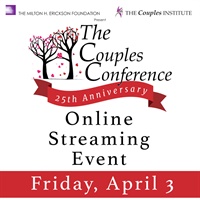
Credit available - Click Here for more information
- Average Rating:
- 28
- Topic Areas:
- Couples Therapy | Conflict | Developmental Therapy Model | IMAGO | Infidelity | LGBTQ | Relational Life Therapy Model (RLT) | Relationships | Sex and Sexuality
- Categories:
- Couples Conference | Couples Conference 2020 | Online Continuing Education
- Faculty:
- Ellyn Bader, PhD | Joseph Winn, MSW, LICSW, CST-S | Terry Real, LICSW | Harville Hendrix, PhD | Helen LaKelly Hunt, PhD | Martha Kauppi, MS MFT | Stan Tatkin, PsyD, MFT | William Doherty, PhD | ....
- Course Levels:
- Master Degree or Higher in Health-Related Field
- Duration:
- 4 Hours
- Format:
- Audio and Video
- Original Program Date:
- Apr 03, 2020
- Short Description:
- A streaming option in place of the Couples Conference 2020 4 hour event. This recording provides a comprehensive cross-section of a variety of approaches to couples therapy, including specific therapeutic models, discussions on sexual desire discrepancies, working with resistance in the therapy room and more.
- Price:
- $29.00 - Base Price
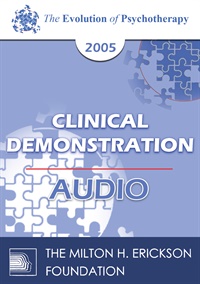
- Average Rating:
- Not yet rated
- Topic Areas:
- Clinical Demonstrations | Dreamwork | Conflict | Psychotherapy | Therapist Development
- Categories:
- Evolution of Psychotherapy | Evolution of Psychotherapy 2005
- Faculty:
- John Gottman, PhD | Julie Gottman, PhD
- Duration:
- 58 Minutes
- Format:
- Audio Only
- Original Program Date:
- Dec 10, 2005
- Short Description:
- Educational Objectives: To list the characteristics of gridlock on perpetual issues. To list the characteristics of dialogue on perpetual issues.
- Price:
- $15.00 - Base Price
- Average Rating:
- Not yet rated
- Topic Areas:
- Workshops | Marriage | Conflict | Couples Therapy | Gottman Method | Psychotherapy
- Categories:
- Evolution of Psychotherapy | Evolution of Psychotherapy 2005
- Faculty:
- John Gottman, PhD | Julie Gottman, PhD
- Course Levels:
- Master Degree or Higher in Health-Related Field
- Duration:
- 2:42:40
- Format:
- Audio and Video
- Original Program Date:
- Dec 08, 2005
- Short Description:
- Scientific research on marriage will be reviewed to answer two questions: What is dysfunctional when a marriage is failing, and what is functional when a marriage is working well? Myths and misconceptions about these questions will be discussed. Research findings will be reviewed to derive two checklists. Although checklists are helpful, they are not fully adequate. To assess a marriage and to intervene we need theory, which will be delineated.
- Price:
-
Sale is $29.00
price reduced from Base Price - $59.00
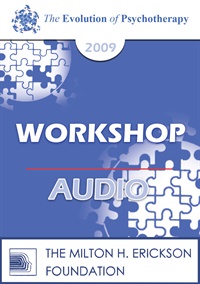
- Average Rating:
- Not yet rated
- Topic Areas:
- Couples Therapy | Workshops | Psychotherapy | Conflict | Marriage
- Categories:
- Evolution of Psychotherapy | Evolution of Psychotherapy 2009 | Pioneers in Couples and Family Therapy
- Faculty:
- Michele Weiner-Davis, LCSW
- Duration:
- 2 Hours 11 Minutes
- Format:
- Audio Only
- Original Program Date:
- Dec 09, 2009
- Short Description:
- This workshop outlines practical strategies for helping couples on the brink of divorce, even when one partner already wants out. Weiner-Davis draws from her Divorce Busting model to demonstrate how hope, directive coaching, and solution-focused interventions can revive connection. She shares how working with one partner can shift dynamics, offers strategies for navigating infidelity, and focuses on honoring emotional pain while guiding couples toward concrete steps forward.
- Price:
- $15.00 - Base Price
- Average Rating:
- Not yet rated
- Topic Areas:
- Couples Therapy | Invited Addresses | Communication | Conflict | Psychotherapy
- Categories:
- Evolution of Psychotherapy | Evolution of Psychotherapy 2013
- Faculty:
- Harville Hendrix, PhD
- Course Levels:
- Master Degree or Higher in Health-Related Field
- Duration:
- 58:14
- Format:
- Audio and Video
- Original Program Date:
- Dec 15, 2013
- Short Description:
- In the old way of thinking, stressed couples were depicted as a failed communication system of interacting pathologies that could be improved by therapists dispensing conflict resolution skills. In the new way of thinking, couples are the source of mutual healing and the fulcrum for social transformation. This lecture will discuss how that shift occurred and its implications, not only for the happiness of couples, but for the relational well-being of society.
- Price:
-
Sale is $29.00
price reduced from Base Price - $59.00
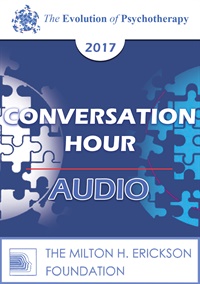
- Average Rating:
- Not yet rated
- Topic Areas:
- Conversation Hours | Couples Therapy | Conflict | Existential Therapy | Psychotherapy | Relationships | Intimacy
- Categories:
- Evolution of Psychotherapy | Evolution of Psychotherapy 2017
- Faculty:
- John Gottman, PhD | Julie Gottman, PhD
- Course Levels:
- Master Degree or Higher in Health-Related Field
- Duration:
- 1:03:04
- Format:
- Audio Only
- Original Program Date:
- Dec 15, 2017
- Short Description:
- EP17 Conversation Hour 05 - John Gottman, PhD and Julie Gottman, PhD Educational Objectives: Describe why not all relationship conflict is the same, and why some conflicts require the therapist to be an existential psychologist. Describe why it is so vital for therapists to measure physiology in couples’ therapy. Describe what Gottman sound relationship house theory and Gottman method couples therapy offers in the following domains: (1) friendship and intimacy, (2) conflict management, (3) shared meaning, (4) trust, and (5) commitment.
- Price:
- $15.00 - Base Price
Credit available - Click Here for more information
- Average Rating:
- Not yet rated
- Topic Areas:
- Great Debates | Couples Therapy | Conflict | Psychotherapy | Relationships
- Bundle(s):
- Learning Track - EP17 Psychoanalysis Stream
- Categories:
- Evolution of Psychotherapy | Evolution of Psychotherapy 2017 | Evolution of Psychotherapy Psychoanalysis Learning Track | Online Continuing Education | Pioneers in Couples and Family Therapy
- Faculty:
- Otto Kernberg, MD | Harville Hendrix, PhD | Helen LaKelly Hunt, PhD
- Course Levels:
- Master Degree or Higher in Health-Related Field
- Duration:
- 1:26:26
- Format:
- Audio and Video
- Original Program Date:
- Dec 14, 2017
- Short Description:
- This debate contrasts psychodynamic and Imago approaches to couples' conflict. One emphasizes transference and unresolved parental dynamics, while the other focuses on empathy, dialog, and the space between partners. Both highlight the role of childhood wounds in adult relationships and the importance of creating safe, empathetic environments where couples can reconnect and prioritize their relationship.
- Price:
-
Sale is $29.00
price reduced from Base Price - $59.00





